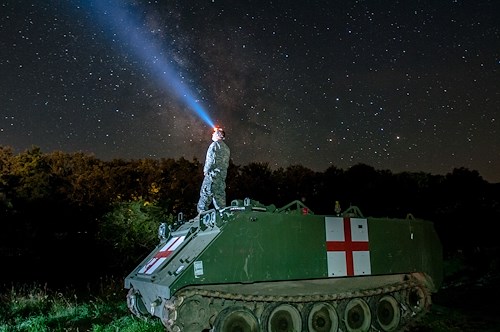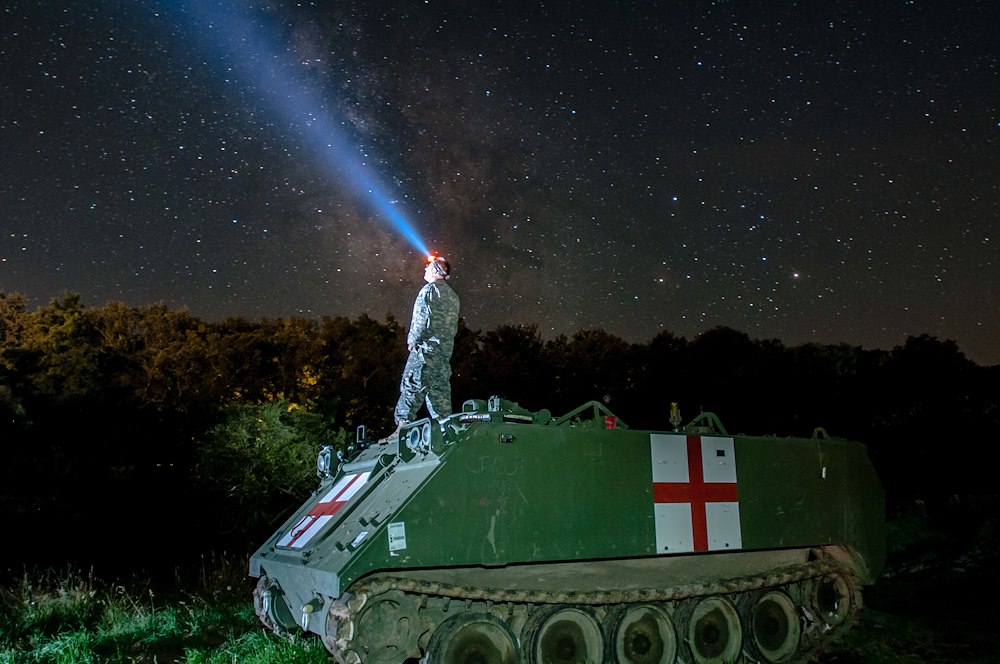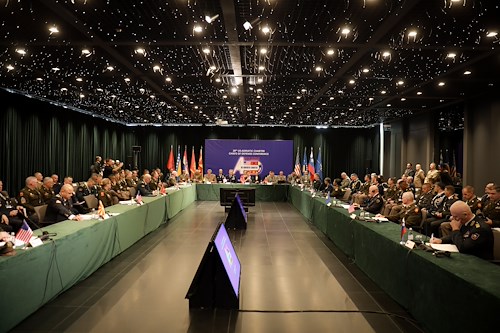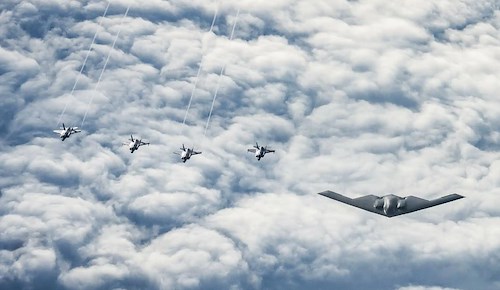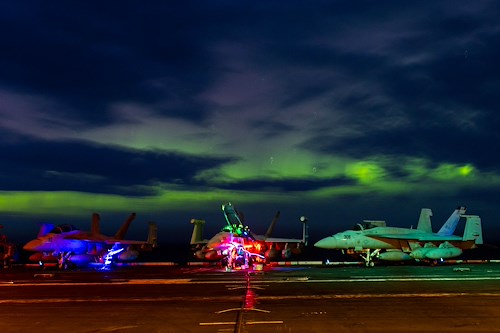Gallery contains 1 image
×
Photo 1 of 1
Healing War
Staff Sgt. Brad Foster, a combat medic with Headquarters and Headquarters Company, 3rd Battalion, 116th Cavalry Brigade Combat Team out of Pendleton, Oregon, watches the night sky on top of an M113 Medical Evacuation Vehicle during Exercise Saber Guardian 16 at the Romanian Land Forces Combat Training Center in Cincu, Romania. Saber Guardian is a multinational military exercise involving approximately 2,800 military personnel from ten nations including Armenia, Azerbaijan, Bulgaria, Canada, Georgia, Moldova, Poland, Romania, Ukraine and the U.S. (U.S. Army photo by Spc. Timothy Jackson, 115th Mobile Public Affairs Detachment, Oregon Army National Guard).
Photo by: Spc. Timothy Jackson
CINCU, Romania -- U.S. Army combat medics live by a creed of trust. Those who have proven their skills under fire and put their lives before others receive the title “Doc.” From the time a soon-to-be medic gives their first IV at Ft. Sam Houston, to the time they hang up their aid bag, a medic will bear blood, sweat and guts to maintain that title.
One combat medic who proved he earned the right to be called “Doc” is Staff Sgt. Brad Foster, with Headquarters and Headquarters Company, 3rd Battalion, 116th Cavalry Brigade Combat Team out of Pendleton, Oregon. Foster, along with his unit, spent three weeks training with other U.S. Army active duty units and nine participating partner nations during Exercise Saber Guardian 16, a multinational exercise designed to develop joint combat readiness.
Foster spent most of the exercise training combat medics in his platoon on how to save lives. During training and war, combat medics make the difference when working with a severe injury to prevent fatalities. Pulling from seventeen years of experience in the field and two deployments, Foster has earned the title of “Doc” within the unit.
“Doc” recalled the fateful day he tested his mettle and steady skills, and earned his title.
It was in 2004, while deployed to Iraq with the 1st Battalion, 6th Field Artillery Regiment during a routine mission, when a rocket-propelled grenade hit the rear vehicle in his convoy. Under the rain of enemy fire, Doc Foster ran to two Soldiers with life-threatening shrapnel wounds, dragged them to safety, and patched them up.
Not even the memory of receiving the Combat Medic Badge for his heroic acts creates the same smile on his face as when Soldiers calls out, “hey, Doc Foster!”
Doc Foster received a call on his cell phone from one of his combat medics who’s out in the field covering live fire, and seamlessly transitioned from healer to leader. He answered in a joking, monotone voice, “Sergeant Foster, Leader of Soldiers.”
The opening line to all the calls he receives from his Soldiers is one way he keeps the atmosphere around his medical platoon relaxed but ready.
At the end of Exercise Saber Guardian, Soldiers are scheduled to have a cultural day where they visit local tourist stops. On this day, Foster said he most wants to sit at a local Café after exploring the cities’ historical buildings.
“I volunteered to come to Romania,” he said, “I love to travel… [and] I really enjoy being a medic, any chance I can go do it I jump on it.”
Being a medic is much more than the physical side of repairing limps and treating sickness, it is a social game of trust. If Soldiers trust their medics to treat them in any situation, they will have the confidence to do higher tempo missions without worrying about the potential for serious injury. The medic is like a rock climber’s harness; it makes the Soldiers feel comfortable.
It is early in the morning, but the sun is already sucking the moisture out of the brownie batter mud. It will be a hot, humid day and Doc Foster is already thinking about the repercussions to his Soldiers.
“Did you drink at least a liter of water since waking up?” he asked a Soldier who walked in for sick call, while handing him a two-liter bottle.
Foster supported Bravo and Charlie Company, 116th CBCT, consisting of 140 Soldiers. There were no heat casualties or serious injuries. Soldiers walked the tightrope of their duty well: the tankers shot 120mm rounds while they maneuvered through uncharted terrain, but had safety on their minds at all time. Infantryman conducted air assault drills and balanced the rush of adrenaline with the reality of danger.
Last year Doc Foster was at the National Training Center in the Mojave Desert, California, with the same group.
“I’ve never seen so many heat casualties in my whole career,” Foster said. “I think a lot of our medics at our NTC rotation realized how viable our training is. It woke up a lot of people, making sure they’re trained up.”
According to Spc. Gaige Spencer, a combat medic, who works for Doc Foster, Foster maintains high expectations of everyone in the battalion aid station. During the NTC rotation Soldiers were doing 14-hour missions with temperatures exceeding 115 degrees. Because of Foster’s work ethic and care for his Soldiers, there were no heat casualties in Charlie Company.
Doc Foster coyly credits junior leaders, the combat medics underneath him, or the lucky stars for the facts that point to the influence of his leadership and medical expertise.
Doc Foster’s selfless service for Soldiers overflows to non-US Soldiers as well, having served all over the world from Korea to Germany to two tours in the Middle East. Saber Guardian saw a total of 2,800 Soldiers from 10 countries and for Foster the wealth of culture and diversity was worth more to him than a subscription to National Geographic.
“When I was in Afghanistan I met some really great friends in the Canadian Army,” Foster said.
He played hockey with them, and even started a ball hockey league. For Foster, hockey was always a door to interact with locals and experience the culture.
“When I was stationed in Korea I got to play hockey with the locals and was invited to their homes,” he said.
“[At Saber Guardian] we are all from different countries, but military guys have similar experiences; there is camaraderie no matter what country you are from,” Foster said. “You may not [always] speak the same language but deep down you know that you experience similar things… it’s kind of unspoken, but its great.”
On the civilian side Foster works with Veterans Affairs as a housing support specialist for homeless veterans in Richland, Washington.
“I love to work with vets, to find homes and get them stable so they can be safe,” Foster said. “It’s the most rewarding work I’ve ever done.”
The Army prepared Foster, especially being at the NCO level where he has to problem solve and think outside the box.
“Everyday is a different day, the scenarios are all different to get these guys taken care of,” he said.
Foster said he sympathizes with the men and women who served and now suffer from Post-traumatic Stress Disorder, and was shocked when he found out how many of his neighbors had served and didn’t have homes.
“They trust me because of my experience being a veteran medic,” he said.

